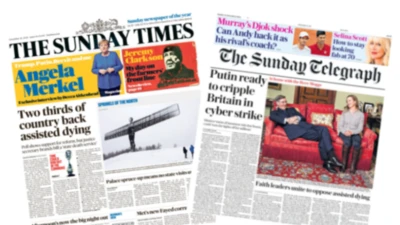We've updated our Privacy and Cookies Policy
We've made some important changes to our Privacy and Cookies Policy and we want you to know what this means for you and your data.
Commuter pain as rail fare rises take effect
Rail commuters preparing to return to work after the Christmas break face fare rises of up to 11% from Monday, watchdog Passenger Focus has said.
Chief executive Anthony Smith said they should not have to keep paying for a "fractured, inefficient industry".
The annual rise will see the average price of regulated fares, such as season tickets, increase by 6%.
The Association of Train Operating Companies said money raised through fares helped pay for better services.
The average rise for all rail tickets - including unregulated fares such as advance and business tickets - is 5.9%.
Passenger Focus highlighted routes which have seen higher-than-average rises compared with January 2011, including season tickets between:
- Chester and Crewe, which rose 10.6%
- Llandudno and Bangor in Gwynedd, which jumped the same amount
- Port Talbot Parkway and Swansea, which increased 8.7%
- Northampton and London, which rose 6.9% to ВЈ4,756
The consumer group said some off-peak return fares between London and towns including Cardiff, Exeter and Plymouth had risen by more than 9%.
Anytime-return fare increases that were well above average - at more than 8% - include those between Birmingham and Edinburgh, and Bristol and Edinburgh, it added.
But it welcomed the fact that unregulated fares had "not been hit in the same way as previous years".
Mr Smith said fare rises would make for a "frosty return to work" for passengers after the holiday period.
"Report after report - the government's own McNulty review into the rail industry's costs - show we have a very inefficient rail industry. The industry costs a lot to run. Those costs are being dumped on passengers, year after year, and we can't keep on doing this," he said.
Mr Smith congratulated "forward-looking" train companies that offered direct debit schemes for season tickets to spread the cost of an annual ticket.
But he said rising car parking charges were piling more pressure on commuters' finances.
The Campaign for Better Transport is organising a day of action on Tuesday against what it calls "rip-off rail fares".
The transport charity is urging people to tweet, text or call the Treasury in protest.
'Value for money'
Michael Roberts, chief executive of the Association of Train Operating Companies (Atoc), said money raised through fares helped pay for improved services.
"For a number of years, the government has sought to sustain investment in the railways by reducing what taxpayers contribute and increasing the share that is paid for by passengers," he said.
"The focus of the whole industry is to keep on reducing the overall cost of running the railways as a way of limiting future fare rises and providing taxpayers with better value for money."
Atoc said record amounts of money were being invested in better stations and more trains.
Currently, passengers contribute about ВЈ6.5bn to the running of the railways, with taxpayers picking up the remaining ВЈ4bn.
Labour urged ministers to stop train operators using "flexible" rules which allow them to hike unregulated fares well over 6% so long as the overall average fare increase does not exceed that figure.
'Commuters clobbered'
Shadow transport secretary Maria Eagle said commuters already struggling with an increased cost of living were in for an "unwelcome new year surprise" when they saw the new price of their rail tickets.
She said: "Commuters are being clobbered by train operating companies' vested interests, who are only interested in making as much money as possible and not in the interests of the passengers."
But Rail Minister Theresa Villiers said: "We have already limited the fare increase this year to help rail passengers.
"But we also have to clear up Labour's deficit. Labour's proposal of more and more spending is not the answer."
ґуПуґ«ГЅ correspondent Graham Satchell said big questions are now being asked about why it costs 30% more to run the railway in Britain than elsewhere in Europe.
But he said passengers would face fare rises of inflation plus 3% for each of the next two years.
The fare increases apply in England, Scotland and Wales.
Top Stories
More to explore
Most read
Content is not available








